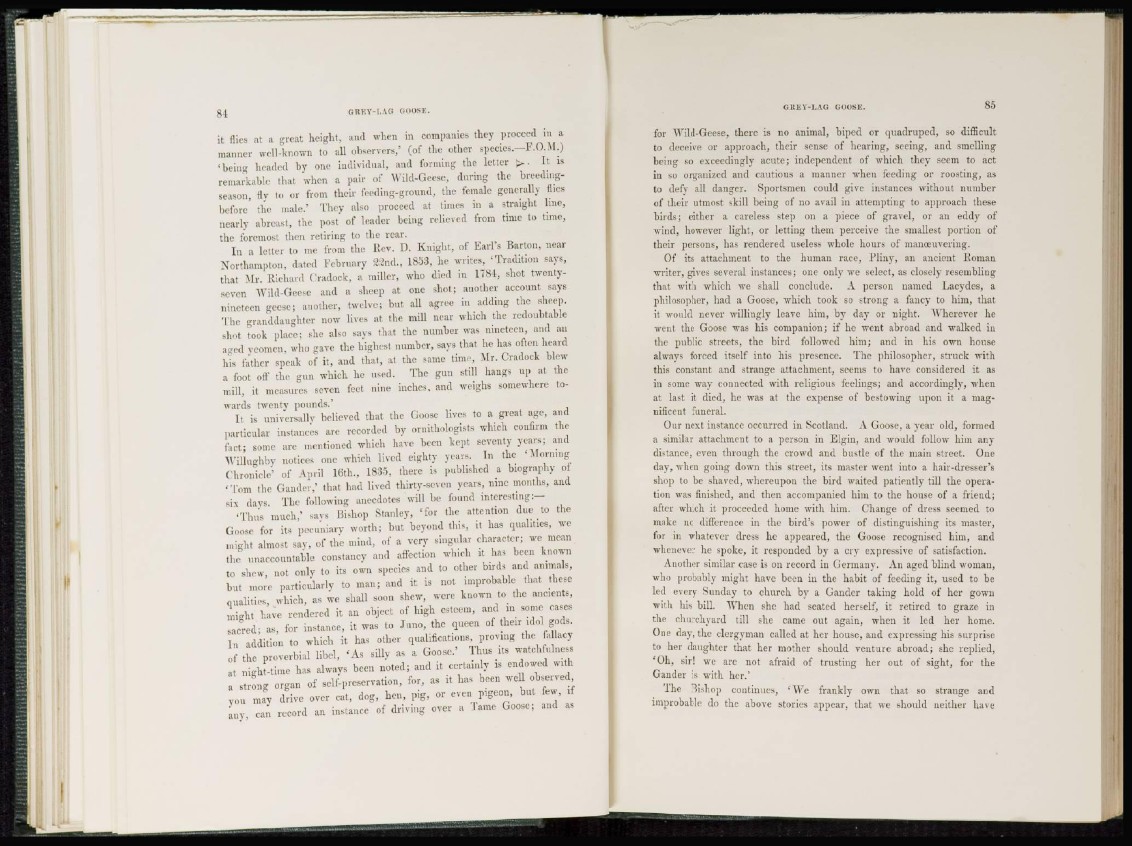
it flies at a great height, and when in companies they proceed in a
manner well-known to all observers,' (of the other species.—F.O.M.)
' b e i n g headed by one individual, and forming the letter [>. It is
remarkable that when a pair of Wild-Geese, during the breedingseason,
fly to or from their feeding-ground, the female generally flies
before the male.' They also proceed at times in a straight line,
nearly abreast, the post of leader being relieved from time to time,
the foremost then retiring to the rear.
I n a letter to me from the Rev. D. Knight, of Earl's Barton, near
Northampton, dated February 22nd., 1853, he writes, 'Tradition says,
that Mr. Richard Cradock, a miller, who died in 1784, shot twentyseven
WIId-Geese and a sheep at one shot; another account says
nim-teen geese • another, twelve; but all agree in adding the sheep.
4 he granddaughter now lives at the mill near which the redoubtable
sh"1 took place; she also says that the number was nineteen, and an
aged yeomen, who gave the highest number, says that he has often heard
his father speak of i t , and that, at the same time, Mr. Cradock blew
a foot off the gun which he used. The gun still hangs up at the
mill, it measures seven feet nine inches, and weighs some when1 towards
twenty pounds.'
I t is universally believed that the Goose lives to a great age, and
particular instances are recorded by ornithologists which confirm the
fact; some are mentioned which have been kept seventy years; and
M illughby notices one which lived eighty years. In the ' Morning
Chronicle' of April 16th., 1835, there is published a biography of
' T om the Gander,' that had lived thirty-seven years, nine mouths, and
six davs. The following anecdotes will be found interesting:—
'Thus much,' says Bishop Stanley, 'for the attention due to the
Goose for its pecuniary worth; but beyond this, it has qualities, we
might almost say, of the mind, of a very singular character; we mean
the unaccountable constancy and affection which it has been known
to shew, not onlv to its own species and to other birds and animals,
but more particularly to man; a n d it is not improbable that these
qualities, which, as we shall soon shew, were known to the ancients,
might have rendered it an object of high esteem, and in some cases
sacred; as, for instance, it was to J u n o , the queen of their idol gods.
I n addition to which it has other qualifications, proving the fallacy
of the proverbial libel, ' A s silly as a Goose.' Thus its watchfulness
at night-time has always been noted; and it certainly is endowed with
a strong organ of self-preservation, for, as it has been well observed,
you may drive over cat, dog, hen, p i g , or even pigeon, but few, if
any, can record an instance of driving over a Tame Goose; and as
G R E Y - L A G GOOSE. 8 5
for Wild-Geese, there is no animal, biped or quadruped, so difficult
to deceive or approach, their sense of hearing, seeing, and smelling
being so exceedingly acute; independent of which they seem to act
in so organized and cautious a manner when feeding or roosting, as
to defy all danger. Sportsmen could give instances without number
of their utmost skill being of no avail in attempting to approach these
birds; either a careless step on a piece of gravel, or an eddy of
wind, however light, or letting them perceive the smallest portion of
their persons, has rendered useless whole hours of manceuvering.
Of its attachment to the human race, Pliny, an ancient Roman
writer, gives several instances; one only wre select, as closely resembling
that with which we shall conclude. A person named Lacydes, a
philosopher, had a Goose, which took so strong a fancy to him, that
it would never willingly leave him, by day or night. Wherever he
went the Goose was his companion; if he went abroad and walked in
the public streets, the bird followed him; and in his own house
always forced itself into his presence. The philosopher, struck with
this constant and strange attachment, seems to have considered it as
in some way connected with religious feelings; and accordingly, when
at last it died, he was at the expense of bestowing upon it a magnificent
funeral.
Our next instance occurred in Scotland. A Goose, a year old, formed
a similar attachment to a person in Elgin, and would follow him any
distance, even through the crowd and bustle of the main street. One
day, when going down this street, its master went into a hair-dresser's
shop to be shaved, whereupon the bird waited patiently till the operation
was finished, and then accompanied him to the house of a friend;
after which it proceeded home with him. Change of dress seemed to
make no difference in the bird's power of distinguishing its master,
for in whatever dress he appeared, the Goose recognised him, and
whenever he spoke, it responded by a cry expressive of satisfaction.
Another similar case is on record in Germany. An aged blind woman,
who probably might have been in the habit of feeding it, used to be
led every Sunday to church by a Gander taking hold of her gown
with his bill. When she had seated herself, it retired to graze in
the churchyard till she came out again, when it led her home.
One day, the clergyman called at her house, and expressing his surprise
to her daughter that her mother should venture abroad; she replied,
'Oh, sir! we are not afraid of trusting her out of sight, for the
Gander is with her.'
The Bishop continues, ' W e frankly own that so strange and
improbable do the above stories appear, that we should neither have